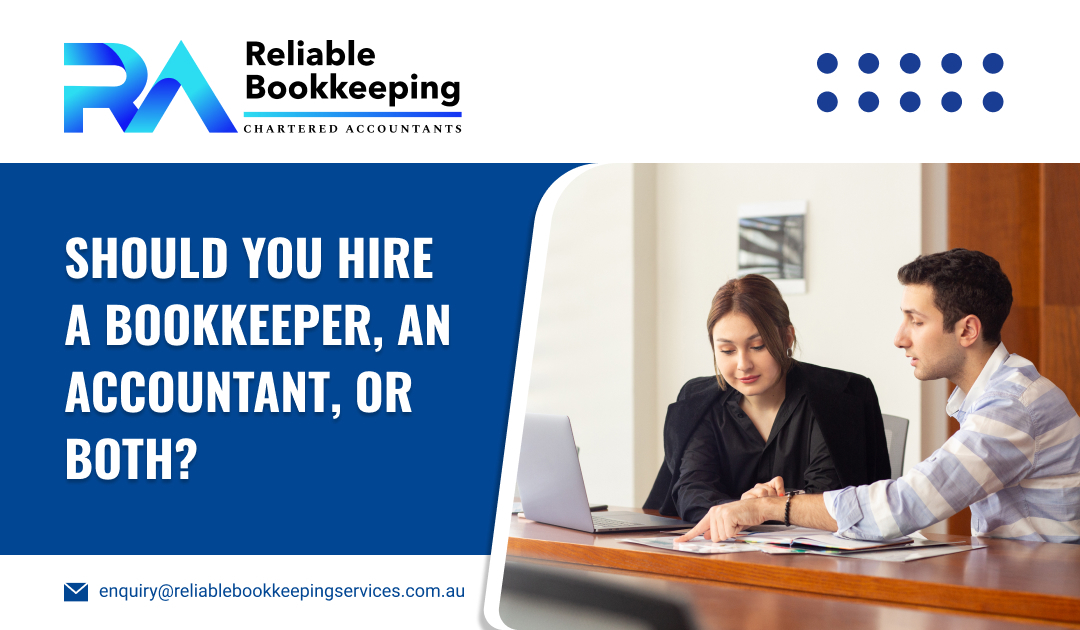When you expand your business, it might become difficult for you to handle business books alone. Later, your financial transactions become complex and difficult to manage without expert assistance. Without a professional bookkeeper for small business, important details can be missed, business progress can slow down, and reporting standards can slip. Due to these facts, business owners often wonder: Should I hire an accountant, a bookkeeper, or both?
Although the terms bookkeeper and accountant are used interchangeably, accountants and bookkeepers bring different skills and expertise. Understanding how each one helps your business can help you stay compliant, strengthen operations, and create a more organised path for your business growth.
What are the responsibilities of a bookkeeper?
A bookkeeper helps keep your business books organised and running your business smoothly by paying attention to your day-to-day financial records. They ensure everything is monitored, processed, and compliant with reporting and legal standards. The primary duties of a bookkeeper include:
- Bookkeeper Melbourne can help you reconcile your bank statements and credit card accounts to spot any discrepancies.
- Records daily business’s financial transactions, such as expenses, sales, and payments.
- Keep ledgers up to date and ensure all accounts show real-time activity.
- Prepares and sends invoices, monitors receivables, and follows up on late or overdue payments.
- Processes payroll, including leave entitlements, superannuation, and employee updates.
- Organise and maintain documentation needed for ATO reporting and audits.
- Ensures all financial records are accurate so a tax return accountant can prepare reports and tax returns.
What are the responsibilities of an accountant?
An accountant helps you make informed business decisions. They identify risks, offer insights, and help you with long-term planning. Here are the primary duties of an accountant:
- Suggesting starting, growing, buying, or closing a business.
- Helping with tax matters, including BAS preparation and lodgment, GST registration, and meeting ATO compliance rules.
- Guidance on meeting reporting requirements on time and accurately.
- Support in increasing eligible deductions, managing income, and applying business concessions to reduce tax.
- Help with employer obligations, including PAYG withholding, payroll setup, and superannuation contributions.
- Help in maintaining compliant and accurate business records.
Do I need an accountant, a bookkeeper, or both?
You may be wondering: Should I hire an accountant, a bookkeeper, or both? The answer depends on your business needs. Bookkeepers manage the daily management of a business’s financial transactions, ensuring that every purchase, sale, and payment is recorded accurately. They keep your company’s financial records updated and organised. An accountant depends on this foundation. They review the records and check for accuracy. This review process helps identify and correct mistakes early, improving the reliability of your business reporting.
- The collaboration of a bookkeeper and an accountant not only helps you with maintaining accuracy but also supports you with effective business planning.
- With accurate information, an accountant can suggest new ways to deal with obligations and help you make informed business decisions to help you with business growth.
- Both of them serve different purposes. The accuracy of records maintained by a bookkeeper helps an accountant to give you the right advice you need for your business.
Benefits of using accounting and bookkeeping services
Accountants and bookkeepers play an important role in running your business successfully and keeping it organised. Using these services together can offer numerous benefits, such as:
- A coordinated approach divides financial reporting and daily transactions tasks logically, avoiding confusion. This ensures seamless workflow and helps control operational costs.
- With integrated systems, data flows efficiently from one step to another without making manual adjustments. This improves accuracy, reduces mistakes, and speeds up the preparation of financial reports, compliance documents, and tax returns.
- They can keep everything managed to enhance the security of your company’s sensitive financial data.
- Your bookkeeper and accountant can collaborate with each other to resolve issues and reduce unnecessary delays.
Conclusion
Having a bookkeeper and an accountant working together for your company can offer numerous benefits for your business. It ensures smarter planning, better accuracy, and stronger financial management. If you are looking for reliable bookkeeping services, you can reach out to us.

